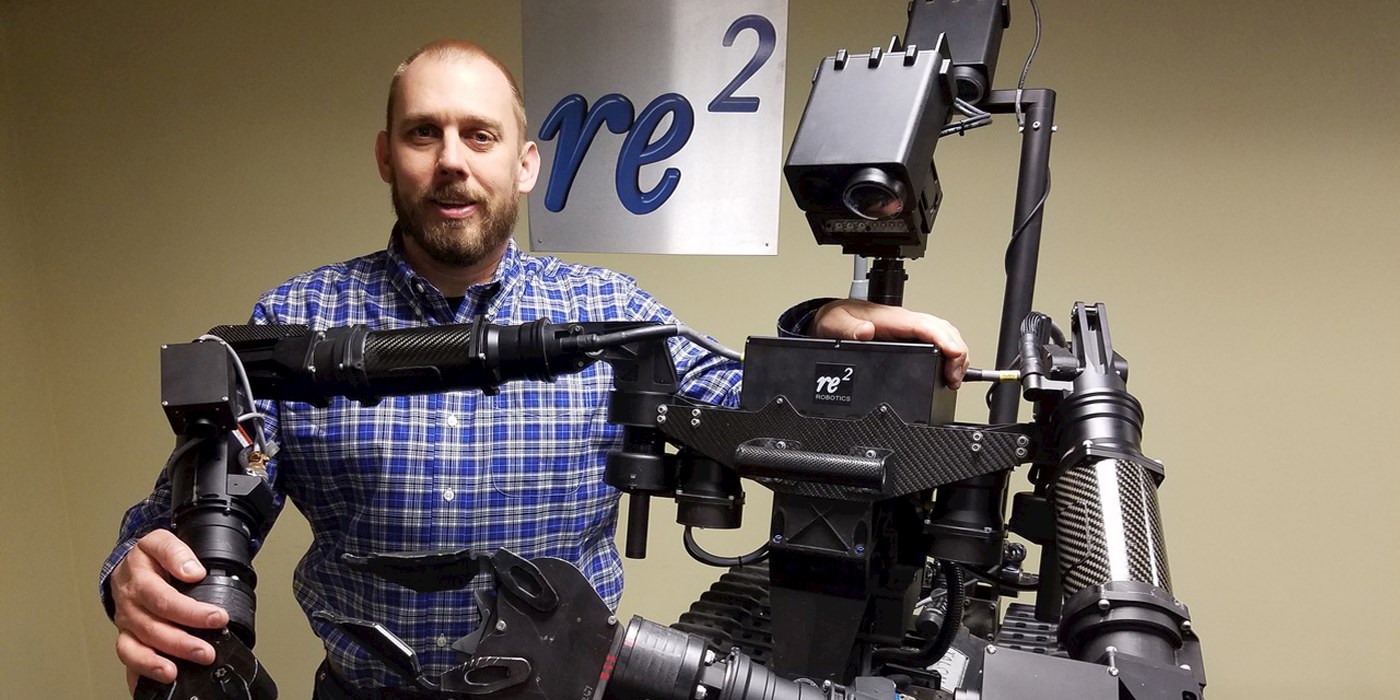Jorgen Pedersen has his arms around the world. Robotic arms, that is, each lending a hand in critical ways.
The arms are why Pedersen, a Carnegie Mellon University graduate and founder of the groundbreaking company RE2 Robotics, won the 2016 Carnegie Science Start-Up Entrepreneur Award.
“RE2 was recognized for its extremely high potential as one of the leading robotics manipulations companies in the United States,” said Rich Lunak, chief executive officer of Innovation Works, who chaired the selection committee for the Carnegie Award. “Their work is inspiring, because it’s literally life-saving technology.”
This technology employs mobile robotic devices so users can remotely and safely interact with the world. The company specializes in manipulator arms, or remote-controlled arms, strong enough to lift a human being and precise enough to defuse a bomb.
RE2 aims to both save lives and improve the quality of lives.
Its primary market is defense, providing robotic arms that perform Explosive Ordnance Disposal. RE2 holds seven patents for manually or automatically attaching tools, such as grippers or drills, to the end of these arms. RE2’s robots have human-like capabilities that perform the most dangerous tasks.
The company’s track record led to a Small Business Innovation Research (SBIR) grant in December from the Army to design an assistive manipulator arm that will transfer servicemen and women from wheelchairs to a transport vehicle and back. In January, the company received a $1 million contract from SBIR and the Army’s Telemedicine and Advanced Technology Research Center to develop LIFELINE, an arm that will assist combat medics in evacuating casualties from the battlefield.
Pedersen gives ample credit for his foundation in robotics to his undergraduate studies at CMU. As a student, he entered a “walking machine” competition with a robot called Sidewinder. Like a modern-day MacGyver, Pedersen had Sidewinder use a dustpan to create an on-the-fly solution to the challenge of picking up an object. His team won third place, and he knew he had found his future.
He earned a bachelor’s degree in electrical and computer engineering in 1995, followed by a master’s degree in robotics from CMU’s School of Computer Science in 1998. He recalled spending many nights in the basement of the Field Robotics Center, learning how to use the lathe and mill.
“Staying up until 4 a.m. making robot feet prepared me for becoming a robotics engineer as much as the knowledge I gained in the classroom,” he said.
After earning his degrees, he spent several years incubating ideas at the school’s National Robotics Engineering Center. Once again, he credited CMU’s hands-on environment for his professional growth, noting that such an atmosphere “invigorates the entrepreneurial community.”
He founded RE2 in 2001, and by 2010, it was the 10th fastest-growing private engineering firm in the U.S.
Today, Pedersen runs the 40-person company in Pittsburgh’s Lawrenceville neighborhood, and continues what he said started at CMU — research that makes a tangible, positive difference in the world.
Count the Director of CMU’s renowned Robotics Institute, Martial Hebert, as one of Pedersen’s admirers. “I’ve known Jorgen since he was a student, so I’ve had the pleasure to witness his journey to becoming a key player in the robotics industry,” said Hebert. “Jorgen is a shining example of the technical excellence and leadership skills of the graduates that our CMU Robotics produces.”




